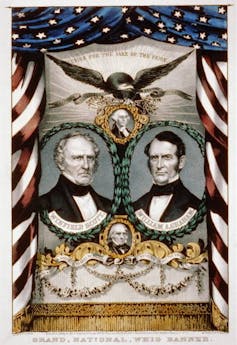Alexander Cohen
The American two-party system has long been under siege. Many founders feared that organizing people along ideological lines would be threatening for the fledgling nation. Alexander Hamilton called political parties “the most deadly disease“, James Madison waived “factional violence” and George Washington feared that an overly successful party would create “terrible despotism“
The newfangled US population is also not fond of parties and tends to give them lukewarm performance ratings. A majority – 57% – of Americans believe that the parties “such needy work” that a third major party is needed, and only 38% think the parties are doing an “adequate job.”
Recent events may suggest that our two-party system is, not surprisingly, breaking down. Donald Trump’s rise caused confusion in the Republican Party, upending its customary hierarchy a self-proclaimed Democratic Socialist Bernie Sanders’ surprising status as front-runner in the Democratic presidential primaries has been revealed deep divisions among Democrats.
Importantly, these changes took place during trust in the government AND congressional approval sitting at historic lows. So, as Some To have he arguedIs America facing the death of its party system?
As a political scientist, I can firmly say “no”.
Why parties?
Like all democracies – and some autocracies – there will always be parties in the US. They are necessary and inevitable for two reasons.
First, they make it easier collective representation individual interests.
Parties address an crucial issue in democracies: people are free to ask the government to do certain things, but the voice of any single person is hushed. Pages amplify individual voices, bringing them together into a louder, cohesive message.
Such organized input is necessary for reasonably effective management that prevents rebellion. As the renowned political scientist EE Schattschneider said he wrote in his 1942 book “Party Government”: “Modern democracy is unthinkable except in party terms.”
Secondly, especially among voters with little political knowledge, party identification makes voting easier. A voter may know nothing about the candidates on Election Day, but can make an informed decision based on party identification.
Even though many Americans view parties as imperfect, they employ them. Without parties, democracy could not function.
Why two parties?
Similarly, the two-party system will survive regardless of political turmoil. This is the result how the US chooses leaders.
The extensive majority of congressional, gubernatorial and legislative elections in America employ the so-called single-member, multiple districtsmeaning each election will produce only one winner.
Since voters generally do not want to “waste” their votes, they focus on their own most preferred candidate to choose from.
Because in a two-party system, this is what the major parties strive for appeal to broad coalitions to maximize electability, it is almost always a Republican or Democrat. It is almost never a third party candidatewhat the voter might actually prefer. Candidates and their wealthy supporters recognize itthat’s why they ally with the main parties rather than form a third party.
A quick look at U.S. history shows the inevitability of these forces.
The founders of the republic themselves, who opposed factionalism, created Federalist Party support and oppose a forceful national government Anti-Federalist Partywhich argued for decentralized government.
Once the question of federal supremacy was settled, the Anti-Federalists were replaced by Democratic-Republican Partywhich defended the agricultural interests of the South. When the Federalists died out, the Democratic-Republican Party split into Whigs and Democrats who disagreed on the balance of power between the branches of government.

Division of Prints and Photographs of the Library of Congress
By 1856, collapse of the Whig Party it was replaced by the anti-slavery Republican Party, whose feuds with pro-slavery Democrats led to the Civil War.
Since then, the situation of these two dominant national parties has remained stable. Third-party challenges were circumscribed and generally insignificant, and tended to be driven by specific issues rather than broad-based concerns.
Stability in the future
Modern Republicans and Democrats are unlikely to follow the path of the Whigs, Federalists, and Anti-Federalists, regardless of recent political earthquakes.
National politics is a different game now than it was during the early republic. Advances in communications and technology improved party organization. The parties can maintain a truly national presence and fend off potential adversaries. Both major parties have shown this willingness stretch to accommodate populists like Trump and Sanders instead of breaking.
Recent changes in Democratic nomination processfor example, demonstrate this flexibility. Third-party barriers that appear on the ballot are rooted in our choices lawsthat have been designed by those running the current system to last.
And donors and lobbyists who want predictable results have no incentive to go all out in supporting a up-to-date player in the game.
Parties have certainly evolved and will continue to do so. For example the once reliably Democratic “Solid South” has turned Republican control, starting with the civil rights movement. However, evolution should not be confused with destruction, and the sustainability of the current system is relatively sheltered.![]()
Alexander Cohen is an assistant professor of political science at Clarkson University. He wrote this piece for him Conversationwhere he first appeared.
![]()

